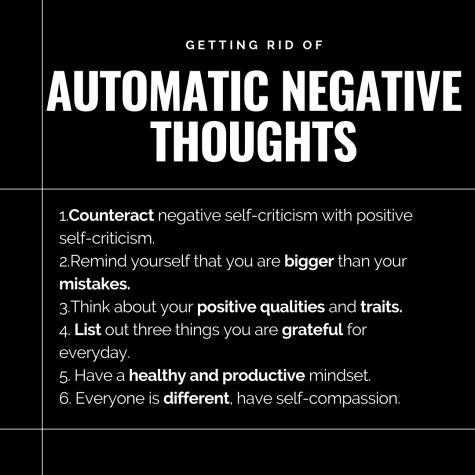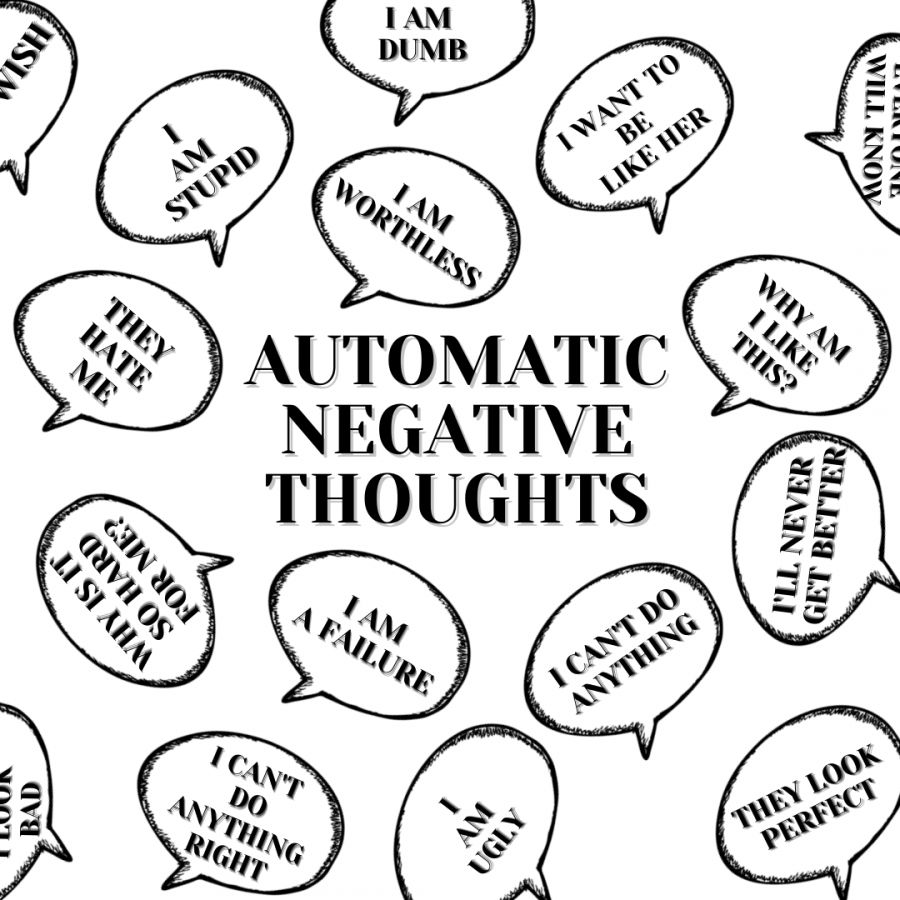Automatic negative thoughts: self-criticism at MVHS
Examining self-criticism and its impacts on the MVHS community
Automatic Negative Thoughts are the conscious or subconscious negative thoughts in reference to one’s self.
March 13, 2021
Laying in bed with her arms stretched to the headboard and toes trying to reach the edge of the bed, school psychologist Sheila Altman recalls the moments when she continually criticized her height while comparing herself to her fellow sports teammates. During her middle and high school days, Altman loved to play basketball and practice ballet. However, due to her height, oftentimes she would get cut from sports teams –– this made her self-conscious In attempts to grow taller, she would continuously use unrealistic measures such as stretching herself because of the pressure that came from her own self-criticism.
“Self-criticism is [the action] of reflecting inwards, it is a very critical eye that [sometimes has a] bias of negativity with oneself,” Altman said. “The other side of the coin for criticism might be coaching. A coach finds areas of weakness or areas of growth that need to be shored up to be at your best and encourages you to grow and build in that area. We all strive to be better versions of ourselves; in order to do that, we need to analyze which are the areas that we’re good and strong in and which are the areas that we might need to work on and improve on. There is this implication [with self-criticism] that puts down or tears down and negatively evaluates what you’re doing.”
Junior Gabi Morali agrees with Altman and states that the environment in which students grow up can greatly impact the extent to which they self-criticize. Morali notes that one of the most common situations in a classroom that often creates a self-deprecating environment is when teachers pass back quizzes or tests; Morali notices how students frequently compare the grades, and many times, students judge each other and themselves based on their scores.
Morali sees self-criticism as expectations that one creates for themselves, and as a Girls Varsity Field Hockey player, she often compares herself to others, which reduces her motivation as a whole. When she was a freshman on the team, she felt as though her performance was disappointing her coaches and teammates, which caused her to overthink situations and feel a sense of shame.
“I started to criticize myself because of [my mistakes] or keep telling myself I did something badly,” Morali said. “If you start to criticize yourself more than you usually would, you would start to create really high standards for yourself, and that can negatively impact the way that you think, and you’re definitely going to fall into some [dark] pit and that cycle is really hard to break once you start it. [If] you don’t reflect on it, and you don’t think about how you can improve, then you’re most likely going to keep failing.”
Freshman Siya Dixit agrees with Morali and points out the importance of understanding the difference between healthy and unhealthy criticism, as it can allow students to accept their individuality and think positively.
“If you criticize yourself [in an unhealthy way], you are picking out every single thing you do wrong and you are just constantly putting yourself down instead of also focusing on your strengths,” Dixit said. “It is common that in school and in friendships, you compare yourself to others and you get an idea of where everyone else is, and you don’t realize that you yourself are a completely different person. When you self-criticize, you are thinking, ‘If [they] can do this, why can’t I do this?’ So if you are not focusing on your strengths, you’re just being reminded that you are not good enough, and that can lower your self-esteem and also prevent you from performing well.”
Altman elaborates on the point of having a growth mindset in order to view situations positively and properly think about areas of weaknesses and how to approach them. She mentions how common it is for MVHS students to use phrases such as “I am a loser. I am a failure. My teacher hates me,” and many don’t think about the impacts it can make on their own mental health.
“We have to stop judging ourselves and exercising the critical voice of beating ourselves up with either shame or guilt or discouragement about why we’re not better, and just be telling ourselves, ‘I’m going to continue to do the best I can to try to maximize liabilities,’” Altman said. “You could have made a mistake, you could have done something that wasn’t good or right, you can’t let that define your whole being and your whole worth. When [you see yourself] getting into negative emotions, that’s your cue that maybe you’re being too judgmental, and what you want to switch to is self-compassion.”
In 1932, Reinhold Niebuhr wrote the “Serenity Prayer”as a way to reach acceptance and recovery. It is repeated to remind reciters to let go of their desire to reach absolute control. Altman explains she often thinks about the first few lines of the prayer to remind herself that some situations may be out of her control, and can rethink whether it is truly worth criticizing and getting upset over.
It reads, “God, grant me the serenity to accept the things I cannot change, the courage to change the things I can, and the wisdom to know the difference. Living one day at a time, enjoying one moment at a time; accepting hardship as a pathway to peace.” 
When speaking to her students about self-criticism and its impacts, Altman tells her students to imagine their negative thoughts as a devil on one shoulder. She then tells them to imagine an angel to counteract this negativity, who reminds themselves of the positive and encouraging aspects of situations. She notices that it makes looking at problems much easier and allows students to zoom out on the issue and question themselves if this small thing defines their character or not. Altman believes the best way to come out of an unhealthy state of criticism is to think about your positive qualities and traits that allow you to realize you are bigger than a mistake.
After having a hard time dealing with self-criticism, Morali explains the methods she uses in order to appreciate all that she has accomplished and will continue to achieve.
“I usually try to counteract negative self-criticism with positive self-criticism [by] saying, ‘It’s OK, you don’t need to compare yourself to other people, they’re not living the same way they are as you. Everybody’s completely different,’” Morali said. “I always remind myself that nobody is going to remember your mistakes and I’m just reminding myself to be grateful. I like to list three things a day of how grateful I am for the capabilities that I have and got very lucky to be at a tough school, even though it might be competitive. You are trying the best you can, and there’s no point in comparing yourself to others. We are all different.”


















